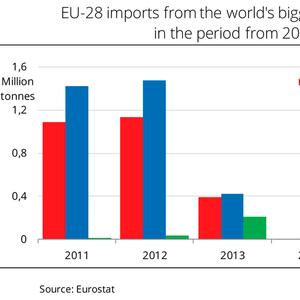EU-28 biodiesel imports likely to increase significantly

September 13, 2017
BY UFOP
EU-28 biodiesel imports from the world's three biggest exporters, Argentina, Indonesia and Malaysia, have dropped substantially since 2013. Whereas in 2012, Argentina still exported 1.48 million metric tons (444.3 million gallons) of soybean oil-based biodiesel and Indonesia shipped 1.09 million tons (327.2 million gallons) of biodiesel produced from palm oil into the EU-28, shipments from each of these countries slumped by around 70 percent in 2013. The reason was the imposition of import duties.
The European Council believed that the two countries were offering their commodities at below actual EU market value by keeping feedstock prices artificially low. For this reason, the EU imposed duties on Argentinian and Indonesian biodiesel (at a rate of 24.6 and 18.9 percent, respectively), which resulted in an almost complete collapse of biodiesel deliveries from both countries.
According to Agrarmarkt Informations-Gesellschaft mbH (AMI), the EU Commission's recent decision to lower import duties on Argentinian biodiesel (from the current 22-25.7 down to 4.5-8.1 percent) is likely to lead to a sharp rebound in Argentinian deliveries. If the tariff rates on Indonesian biodiesel are also lowered in the wake of a decision that is still outstanding, a considerable amount of biodiesel is likely to flow onto the EU-28 market in the spring of 2018, creating pressure on prices and affecting the competitive position of European rapeseed oil-based biodiesel.
Advertisement
Advertisement
Advertisement
Advertisement
Related Stories
The U.S. EPA on July 8 hosted virtual public hearing to gather input on the agency’s recently released proposed rule to set 2026 and 2027 RFS RVOs. Members of the biofuel industry were among those to offer testimony during the event.
The USDA’s Risk Management Agency is implementing multiple changes to the Camelina pilot insurance program for the 2026 and succeeding crop years. The changes will expand coverage options and provide greater flexibility for producers.
President Trump on July 4 signed the “One Big Beautiful Bill Act.” The legislation extends and updates the 45Z credit and revives a tax credit benefiting small biodiesel producers but repeals several other bioenergy-related tax incentives.
CARB on June 27 announced amendments to the state’s LCFS regulations will take effect beginning on July 1. The amended regulations were approved by the agency in November 2024, but implementation was delayed due to regulatory clarity issues.
SAF Magazine and the Commercial Aviation Alternative Fuels Initiative announced the preliminary agenda for the North American SAF Conference and Expo, being held Sept. 22-24 at the Minneapolis Convention Center in Minneapolis, Minnesota.
Upcoming Events










